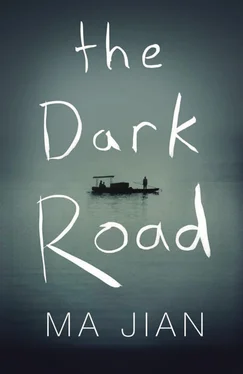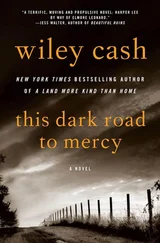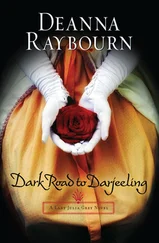‘What an honour! Aren’t you proud?’ Meili rubs the cash in her pocket, and thinks what an odd coincidence it is that just after singing at a stranger’s funeral she hears of a death in her own family. She resolves never to sing at a funeral again.
‘He was a twelfth-level cadre, so of course he was entitled to have a Party flag over his coffin.’ Kongzi takes a sip from the mug of warm wine Meili gives him, then swallows the rest in one gulp. Nannan runs back into the room with Lulu, who’s come round to see her. Unlike Nannan, whose eyes slant elegantly upwards, Lulu has large goldfish eyes.
‘Go out and play, girls,’ Meili says, noticing tears drip down Kongzi’s face. She gives the girls two date biscuits and says, ‘Off you go now!’
‘But I’m tired,’ Nannan says, pursing her lips. She’s wearing her red flower hairclip, blue jeans and a red jumper covered with stickers of cartoon characters.
‘Can you take Nannan back to your place, Lulu?’ Meili says. ‘Tell your mother I’ll fetch her in an hour.’
Keywords: Tumour, Bedraggled.
KEYWORDS: tumour, bedraggled alchemists, heart as soft as tofu, electronic messages, refurbished, second-hand.
HEARING LOUD WAILING, Meili leaves the kitchen, goes up to little Hong’s bedroom on the second floor and picks her up out of the cot. ‘Don’t cry, little one, here’s your milk,’ she says. She pushes the bottle’s teat into Hong’s mouth and watches her stomach rise and fall in time with the sucking noises, and drops of milk run down her chin and neck. Meili can tell genuine imported milk powder from the fake domestic products simply by squeezing the bag. While running her market stall in Xijiang, she learned that imported powder is soft, but fake powder is hard and granular and tastes so bad that babies will only drink it if strawberry flavouring is added. She’s been working as a nanny for Tang’s sister-in-law, Jun, since Jun gave birth to Hong seven months ago. She often fantasises that Hong is little Heaven, who’s still stubbornly planted in her womb. Hong’s fine black hair has grown so long that it now falls below her eyes. When it’s brushed back into a ponytail, the white marks from the chickenpox she contracted last month are visible on her forehead. Beside the cot are a nappy-changing table and a chest of drawers piled with soft toys — teddy bears, puppies, monkeys, elephants — which make the bare room seem full of life.
‘Don’t let her finish the bottle, Meili,’ Jun shouts up from the first-floor sitting room where she’s playing a game of mahjong. ‘I want her to finish off with some of my milk.’
Meili doesn’t like the sitting room. The beige fake leather sofas and blue tiled walls dazzle her eyes, and the Hong Kong soap operas blaring from the television and constant clatter of mahjong grate on her nerves. Tang’s family bought this three-storey Western-style villa four years ago. Most of the Heaven residents who’ve made money from electronic waste live in houses like this. The ground floors are used as workshops or storerooms, the first and second floors for the living areas, and the flat roofs for drying clothes and sitting out in the summer. Meili hands Jun the baby to breastfeed, then stands at the kitchen sink washing bottles and bibs, listening to Tang speak to his brother about England. ‘And they’ve even stopped building new motorways, just so children can play safely in the fields…’ he says, glancing at little Hong as she latches onto Jun’s breast.
‘They put children before the country’s economic development? No wonder they’re an empire in decline.’ Tang’s brother slides a mahjong piece forward and expels a stream of tobacco smoke through the corner of his mouth. He has the same buck teeth as Tang.
‘Human life is more important to them than money. Heaven is so choked with waste these days that even if you’re rich, you have no quality of life.’
‘How can you say that?’ the brother replies. ‘You live in this beautiful villa, dine on fresh seafood every day, sleep on an imported sprung mattress and you can hop over the border to Hong Kong or Macao whenever you like. What more could you want?’
‘Yes, if China’s economy hadn’t developed so fast, you wouldn’t have been able to study abroad,’ Jun chimes in. ‘Down, naughty dog!’ she shouts to the black lapdog that’s coming up the stairs. Since Hong was born, the dog has been banished from the sitting room and has to live among the crates of cables on the ground floor.
‘May this fish bring us abundance!’ Meili says, walking out of the kitchen with steamed carp she has prepared in the Cantonese style. The fragrance of ginger, spring onion and sesame oil briefly masks the odours of sulphur drifting up from the workshop downstairs.
She sits between Tang and his brother. After Jun finishes nursing Hong, she serves Tang’s mother a chunk of suckling pig and switches on a soap opera called The Qing Dynasty God of Medicine . An ancient courtyard residence is on fire, and men with long pigtails are rushing about in panic, shouting commands in Beijing accents. Tang’s father comes in and joins them at the table. He doesn’t like mahjong, so spends most of his time with the workers downstairs or tending his plants on the flat roof.
Meili takes little Hong from Jun and studies the dishes she’s brought to the table. The pigs’ trotters braised in bitter gourd and the garlic-fried aubergines look fine, but when she sticks a chopstick into the carp she sees flecks of blood near the bones and wishes she’d given it two more minutes.
‘Thank you, Meili,’ Tang exclaims. ‘What a feast!’ He fell in love with her as soon as he heard her sing at the funeral, and now that she’s working for his family, he’s continually finding excuses to spend time with her or give her a small tip. When Hong has her afternoon naps, he teaches her to type and guides her through the internet, helping her explore her areas of interest. Meili likes to watch clips of fashion shows and pop concerts. The first time she saw a Madonna video, she abandoned her dreams of becoming a singer for good. ‘What a star!’ she sighed, gazing at her cavort around the stage in a golden bodice. Every morning, Tang puts on a surgical face mask and goes jogging around the lake. He told Meili that in England, he used to jog every day in the forest near his university campus. When he gets back, Meili gives him a bowl of fish slice congee, a bread roll or a custard tart. He’s not fussy about what he eats.
Meili appreciates the kindness he shows her, especially when his mother or Jun scold her for not cleaning the bottles properly or for overcooking the rice. On those occasions, Tang will always look up from his computer, ask Meili to pour him another cup of tea, then whisper in her ear that his mother has a mouth as sharp as a knife but a heart as soft as tofu. His words reassure her, but she doesn’t want him to grow too fond of her. She’s afraid of men, and of losing control. But when she hears him sitting at his desk talking to female friends on the phone, she feels sad, and wonders if she’d feel the same if she heard Kongzi speak to other women in a similar tone.
After clearing away the dinner and washing the dishes, Meili goes to the second floor to say goodbye to Tang. He points at his computer screen and says, ‘Look, this student has written an article about pollution in Heaven Township: “Using 19th-Century Techniques to Dismantle 21st-Century Waste”. See here, it says: “Migrants toil like bedraggled alchemists in family workshops, washing circuit boards in sulphuric acid to salvage tiny granules of gold.” And look at this picture: “Female workers strip plastic casings from electric cables with their bare hands, their only tools a fold-up table and a rusty nail…”’
Читать дальше












